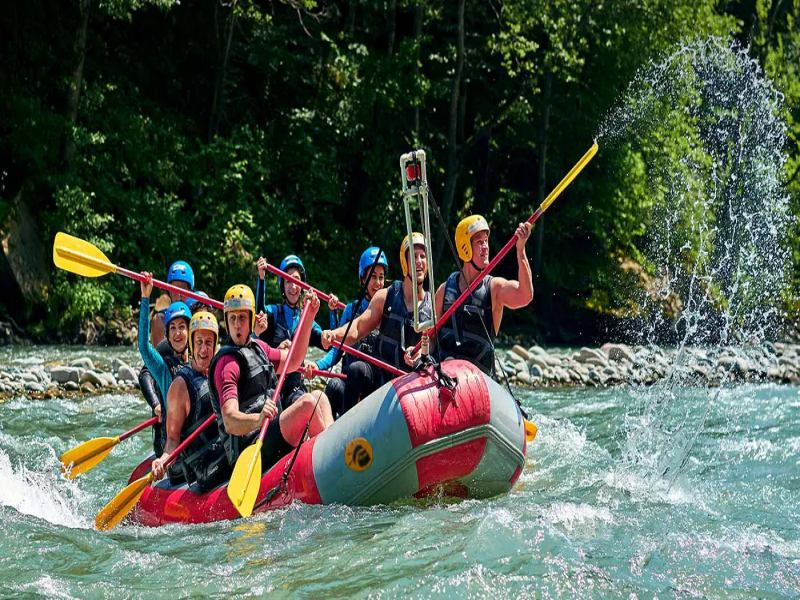Eco-Friendly Rafting: Sustainable Adventures in Sri Lanka

Eco-Friendly Rafting: Sustainable Adventures in Sri Lanka
Table of Contents
ToggleIntroduction
The “Pearl of the Indian Ocean”, Sri Lanka, is for lovers of nature – with its rich rainforests, shining waterfalls and abundant wildlife. While eco-tourism becomes increasingly popular, tourists are looking for opportunities to visit such regions with least harm to this virgin landscape. There is an opportunity to enjoy the amazing rafting and eco-tourism at the same time which helps to save Sri Lanka and its magnificent nature. Read on to know more about what it is and its advantages, choice of locations, and useful tips on eco-friendly rafting in Sri Lanka.

Why Choose Eco-Friendly Rafting in Sri Lanka?
Minimize Environmental Impact
Typically, conventional rafting causes impacts on physical environment through use of motorized rafts and poor disposal of wastes. Finally, while some serious rafting companies seek to create one of the largest negative footprint and negatively impact the rivers and environment of Sri Lanka.
Key eco-friendly practices:
- Non-motorized rafts: Employing such equipment like non-motorized rafts or inflatable rafts or wooden canoes also do not pollute the water or make noise.
- Proper waste disposal: Reduction of waste in general with special concern to the dumping of garbage, recycling and proper disposal of wastes and litter.
- Respecting wildlife: Informing the guests proper conduct of guest interactions with wildlife, as well as refraining from intruding into animal territories.
Support Local Communities
Sustainable rafting is usually accompanied with support to the local people. This means that every conscientious operator must focus on the positive impact his direct operations can make on the economic well-being of the destination and capability of the host communities.
Ways eco-friendly rafting supports local communities:
- Employing local guides: Local guides are more easily employed and evident, this way, the visitor gets to learn from them while at the park.
- Sourcing food and supplies locally: A locally sourced food supply not only benefits the local economy but also cuts back on the carbon footprints involved with food transportation.
- Supporting conservation efforts: Most of the recognized environmentally-sensitive rafting companies patronize some conservation measures, for instance, tree-planting or animal-sanctuary.
Through taking eco-friendly rafting, that means that you shall be making a direct input to the environmental and social welfare of those affected communities.
Improve the Experience on the Raft
There are various measures, which are eco-friendly and not only preserve and promote the natural environment and the communities, which are directly involved in rafting business but also add to the general experience of rafting. They may hinder one from enjoying serene and rewarding sights of Mother Nature at its best with much appreciation to the magnificent rivers in Sri Lanka.
Benefits of eco-friendly rafting:
- Enjoying pristine natural surroundings: Immerse yourself in the calm of unspoiled river and beautiful countryside without disturbance of sound and dirt from engine boats.
- Learning about local ecosystems: Learn from experienced local guides and guides specific to the kinds of flora or fauna of the rivers and the waters around Sri Lanka.
- Appreciating the tranquility of nature: Be fully immersed in nature and departure from the normal routine and experience the tranquility in non-motorized rafting.
Where to Find Eco-Friendly Rafting in Sri Lanka
Kitulgala
Kitulgala is a picturesque town situated in the in the rainforest of Sri Lanka’s western province, and it is famous for white-water rafting that bear a touch of nature. Located in the central part of sri lanka and passing through Kitulgala the Kelani River is famous for challenging rapids and beautiful scenery during the rafting exercise. Some of the numerous environmentally friendly rafting companies in the region offer the trips with considerations to the environment and people.
Kithulgala (in an effort to rank higher on the Search Engine Results Page or SERP)
There are, however, some misunderstandings that it is specified as ‘Kithulgala’ which is actually a misspelling of Kitulgala. By using this type of the word to refer to this gorgeous rafting destination, those who mistakenly typed the wrong word into their search engine will be redirected to the right information.
Other Rafting Destinations
Thus, together with Kitulgala Sri Lanka also provides with other possibilities for ecotourism, rafting in different rivers being the most famous one. In the southwest of the island there is another interesting river for rafting – the Kalu Ganga.
What to Look for in an Eco-Friendly Rafting Operator
It is, therefore, very important that to undertake an appropriate form of rafting that will create right impacts to the environment. Here are some key factors to consider:
Commitment to Sustainability
Select operators with a stated and measurable concern towards sustainability. As a contingency it could entail certifications by recognized bodies like the Sri Lanka Tourism Development Authority; SLTDA, international eco-tourism certifications. Ask them about such things as on how they dispose their waste, how they conserve energy and measures taken to protect wildlife.
Respect for Local Communities
Responsible operators always seek to derive gains for local people and accord them respect and dignity in the process. This may extent to providing wages to local guides, train staff on cultural sensitivity and support projects within the community.
Safety and Quality
Before selecting an operator for a rafting experience safety should always come first. Thus, warm up with operators who have experienced and qualified guides, quality equipment and proper orientation on safety measures. Check whether or not they conform to the international safety measures and whether guests have fun while being safe on the river.

Tips for Sustainable Rafting
Choosing an eco friendly operator is one thing, but there are other things that ordinary individuals can do make rafting a sustainable sport. Here are some tips to keep in mind:
Pack Light and Responsibly
When packing for your rafting adventure, pack lightly and also wherever possible select items that are environment friendly. This way, wastage is avoided and you end up cutting down your footprint on the natural environment.
Sustainable packing tips:
- Reusable water bottle: Do not allow yourself to buy that water bottle which is usually plastic based but fill your own bottle that is rechargeable.
- Eco-friendly sunscreen: Always use sunscreen that it is not a threat to the reef and it should be biodegradable for the general health of the environment.
- Biodegradable soap: It is recommended to pack biodegradable soap used for washing up in order to reduce the pressure on water sources.
- Reusable bags: Take along your reusable bags in which you can pack the items you have with you and any rubbish.
Respect Wildlife and Nature
There is lot of wildlife found in the Sri Lanka rivers and the surrounding areas. We should respect their environment and should not intrude into their area by getting to close.
Tips for respecting wildlife:
- No littering: Throw all the trash in the right disposal bins and ensure that you don’t leave anything behind you.
- Staying on marked trails: Refrain from going off trail that are established because this prevent interference with many wildlife and their natural habitats.
- Respecting local customs: Respect the local culture and culture interactions in particular, with regards to visiting cultural or religious sites.
Select Environmentally Friendly Hotels
Take time and select an accommodation that will also enhance the environmentally friendly cause. Choose stores or accommodation places that have implemented policies on save energy, water and reduce waste. Local vendors support creates benefits for the local economy as well since people will be encouraged to shop from local and organic markets.
Examples of eco-friendly accommodations:
- Back of Beyond: That is why this Sigiriya based eco-lodge promotes a responsible form of tourism while providing a roof over guests’ heads.
- Uga Escapes: It is a chain of small accommodations in Sri Lanka for tourists that adapts successfully eco-tourism principles and involves a community.

Benefits of Eco-Friendly Rafting
Sustainable rafting has a myriad of advantages that go beyond the physical enjoyment of the activity that is rafting.
Environmental Preservation
When you opt for the green rafting, you shall support the company that acts in favor of preserving the environment of Sri Lanka. Responsible operators ensure that the impact to the ecosystems is kept to the minimum, and must help in conservation as well as educative the people on the environment.
Examples of environmental benefits:
- Reduced pollution: Saddle not motorized rafts reduce noise and pollute water hence preserving aquatic life and minimize disruptions’ to rivers.
- Support for conservation: It is typical for many operators to make a number of environmentally friendly contributions such as supporting reforestation activity or wildlife protection.
- Education and awareness: As an example, many companies offer seasonal rafting trips for ecotourism purposes for purposes of sensitizing the society on conservation of natural resource, and acting as responsible tourists.
Cultural Exchange
Sustainable rafting may contribute for intercultural interactions and learn elements of Lorenz cultural notions among the visitors and the inhabiting societies. This means that cultural, traditional and even political perspectives of the local guides are easily learnt.
Opportunities for cultural exchange:
- Learning from local guides: Local guides provide information about the river’s configuration, vegetation and geographic features, and culture.
- Supporting local businesses: Selecting local hotels and restaurants and insisting on the local involvement in the procurement of their supplies contributes positively to the economy as well as retention of culture.
- Respecting local customs: Cultural differences should be observed and embraced this creates a usual relationship and gains the trust of the local people.
Personal Growth
Sustainable rafting is also a fascinating experience that gives people valuable personal insights and a new perspective at their attitude towards nature.
Ways eco-friendly rafting can foster personal growth:
- Disconnecting from technology: Disconnection with technology and involvement in environmental surroundings is a good way of thinking and resting.
- Challenging yourself physically and mentally: Rafting is a team event, which entails physical activity, concentration and is a very excellent way of practicing adventure and skills.
- Gaining a deeper connection with the natural world: There is empirical evidence that people who directly immerse themselves into natural environments tend to develop appreciation of the environment.
Conclusion
Sri Lankan rafting can be made environment friendly and for that there are potent opportunities to blend fun with responsibility. They don’t need to forget that they can enjoy the speed and vividness of white-water rafting selecting the operators carefully and acting as an ecological and social tourist. Enter the culture of adventure and allow yourself to get carried away through Sri Lanka’s more untouched rivers, and make memories for a lifetime whilst making a tangible and positive impact to the environment and the communities you’ll come across along the way.
Recent Posts
Kitulgala on Horseback: Explore the Countryside on a Scenic Trail Ride
Spiritual Sites Near Kitulgala: Discover Ancient Temples and Sacred Places
Kitulgala for Digital Nomads: Work Remotely in a Stunning Natural Setting
Tags





